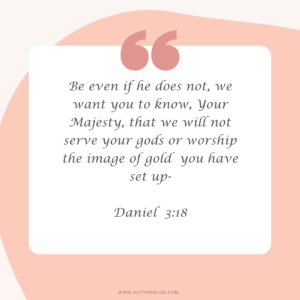So often, we can become desensitized to stories we read in the Bible. Perhaps some accounts we have relegated as children’s Sunday school stories while overlooking the profound messages they offer. Let’s discuss one today. Daniel 3 holds an epic tale of an encounter between King Nebuchadnezzar and the three Israeli companions: Shadrach, Meshach, and Abednego.
Just a little background, the king had decreed that everyone within hearing distance should fall and worship upon hearing instruments and music playing. As in many situations, tattle-tales, snitches, or blabbermouths trot off to His Royal Highness, Nebuchadnezzar. The three amigos are brought up on charges before the King’s court to explain why they refuse to bow. Follow along with their response:
Daniel 3:14- 18 (NIV):
14 and Nebuchadnezzar said to them, “Is it true, Shadrach, Meshach and Abednego, that you do not serve my gods or worship the image of gold I have set up?
15 Now when you hear the sound of the horn, flute, zither, lyre, harp, pipe and all kinds of music, if you are ready to fall down and worship the image I made, very good. But if you do not worship it, you will be thrown immediately into a blazing furnace. Then what god will be able to rescue you from my hand?”
16 Shadrach, Meshach and Abednego replied to him, “King Nebuchadnezzar, we do not need to defend ourselves before you in this matter.
17 If we are thrown into the blazing furnace, the God we serve is able to deliver us from it, and he will deliver us from Your Majesty’s hand.
18 But even if he does not, we want you to know, Your Majesty, that we will not serve your gods or worship the image of gold you have set up.”
I’ll give you a quick synopsis; the king imposed a death sentence upon the trio. A fourth man appears to the bound friends after they were thrust into a fire seven times hotter than usual. The scene plays out in front of Nebuchadnezzar and his audience (excluding the toasty bunch who threw them in). Shadrach, Meshach, and Abednego are seen unbound, unsinged, and standing side by side with the “one who looks like the son of the gods” (v. 25). Summoning the men out of the fire, the king retracts his previous decree and professes a new one. King Nebuchadnezzar declares that because of their faithfulness and an unshakeable determination to trust God and not to worship any other gods, anyone speaking against their God would be cut into pieces and then thrown into a pile of rubble. What a turn of events! Can you imagine witnessing this?
I want to draw your attention to verses 17& 18, where the Jewish boys emphatically state their response. Without any doubt, they claim if they are thrown into the burning blaze, God has the ability to save them. There is no question in their minds that God is able. However, verse 18 is the clincher; without hesitation, they respond with “but even if he does not.” This is the message we miss, a message full of faith and assurance that no matter what we are going through, we can trust the outcome to God.
they claim if they are thrown into the burning blaze, God has the ability to save them. There is no question in their minds that God is able. However, verse 18 is the clincher; without hesitation, they respond with “but even if he does not.” This is the message we miss, a message full of faith and assurance that no matter what we are going through, we can trust the outcome to God.
The story speaks to God being sovereign and all-knowing, but he isn’t a genie in a bottle. We don’t pray to manipulate the hand of God as if we even could. Our prayers are requests to make known to him, not definitives we expect answered. Shadrach, Meshach, and Abednego’s response should also be ours, especially when walking through the darkest of nights and the deepest of valleys. It should be our response when we don’t see God move, don’t hear the whisper of his voice, or don’t feel his gentle touch. Our reaction should be unequivocal: we will still worship him even if God doesn’t respond as we think he should. We will remain faithful and still trust that he knows and has our best interest at heart.
Since we know the ending of this narrative, it has given us hope when we are in the thick of the fire; he is there. Yet consider what if he hadn’t? Shadrach, Meshach, and Abednego made an allowance for this when they declared, “Even if he doesn’t.” As each turn of the rope tightened their limbs, the king’s men shoveled whatever material they chose to intensify the heat, and each billow of smoke rose from the chimneys; they purposed not to serve other gods. It wasn’t an option. There wasn’t a pause or justification, just perseverance to remain faithful to the One who had already proven faithful to them.
Psalm 18:25 comes to mind here-
To the faithful you show yourself faithful; to those with integrity you show integrity.
 Friend, I know it’s easy to get disillusioned when you have been praying and believing for an answer to a prayer. I, too, experienced the shaking of my faith and a loss of hope for a season when our family endured a traumatic event. Our prayer wasn’t answered as we thought it should, and sadly, I crumbled, questioned, and doubted. That season produced seeds of doubt that had me entertaining thoughts of unbelief. My response was one of fear. Fear that I could never pray effectively again, fear that every outcome would end up in loss and uncertainty. The fact remained that, unlike the three companions, my focus was on myself and how can I get God to give me what I wanted. My perspective wasn’t on God, his goodness, and how faithful he had been to me until that horrible loss. In truth, I was stuck on the why or, more accurately, the why not. You see, God doesn’t pivot based on our emotional pleas. Does he hear them? Absolutely! See Psalm 145: 18-19 for more clarity. Dozens and dozens of scriptures testify that God hears our cries.
Friend, I know it’s easy to get disillusioned when you have been praying and believing for an answer to a prayer. I, too, experienced the shaking of my faith and a loss of hope for a season when our family endured a traumatic event. Our prayer wasn’t answered as we thought it should, and sadly, I crumbled, questioned, and doubted. That season produced seeds of doubt that had me entertaining thoughts of unbelief. My response was one of fear. Fear that I could never pray effectively again, fear that every outcome would end up in loss and uncertainty. The fact remained that, unlike the three companions, my focus was on myself and how can I get God to give me what I wanted. My perspective wasn’t on God, his goodness, and how faithful he had been to me until that horrible loss. In truth, I was stuck on the why or, more accurately, the why not. You see, God doesn’t pivot based on our emotional pleas. Does he hear them? Absolutely! See Psalm 145: 18-19 for more clarity. Dozens and dozens of scriptures testify that God hears our cries.
We tend to forget that our faith relies on something other than whether our prayers come true. They are prayers, not wishes. Our confidence and 100% certainty are in the great I AM. We can attest with 100% certainty that our prayers are heard.
I love what Dr. Timothy Jennings writes regarding the Christian faith in his book, Could It Be This Simple?
“Christianity teaches us to look not at self but at Christ. Why does God say, ‘Worship Me’? Is He insecure? Does He somehow need our validation and approval? Does it really matter what we worship? God tells us to ‘worship me’ because we actually adapt ourselves to the things we admire and devote ourselves to things we idealize”.
Going back to our story, the fearless men knew who they worshiped, so their hope remained fixed that God, who they worshiped, would rescue them in the way he thought best. They didn’t idealize their plea or try to adapt to their circumstances. It was a secure, unwavering reaction not in themselves but entirely in God.

Next time you are struggling with a prayer, and become hyper-focused on the outcome, consider the Bible story of the three friends and their response, “Even if he doesn’t, we will worship no other gods.”
Dear friend, I pray this devotional adds peace and comfort to you. I am thinking and praying for you. Share with another if it has blessed you.
XO,
Katherine







0 Comments